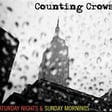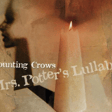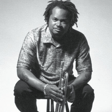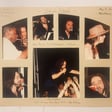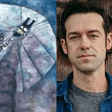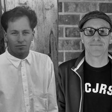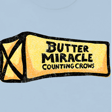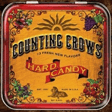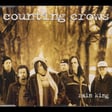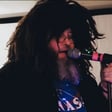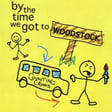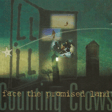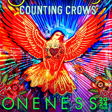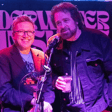Become a Creator today!Start creating today - Share your story with the world!
Start for free
00:00:00
00:00:01

E18: David Lowery Interview
David Lowery is the lead singer of Cracker and Camper Van Beethoven. He also produced Counting Crows' amazing third album This Desert Life.
Join us for this special interview, where we talk about his vision for the album and his memories recording it.
To learn more about David:
https://davidlowerymusic.com/home
To email us:
SullivanStreetPC@protonmail.com
Transcript
Introduction and Guest Overview
00:00:16
Speaker
Welcome to episode 18 of Sullivan Street, where we are going to talk to special guest David Lowry. But first, I'll say hello. Good afternoon to Chris Makes. Hey, Eric. How's it going? Fantastic. I'm excited. We've been on a roll. We've had some great guests, and it's continuing with a very special guest today, David Lowry. So for Counting Crow's fans, of course, most famous for being the producer of their esteemed, unique, well-loved
00:00:43
Speaker
album, This Desert Life, and we're going to spend the majority of our time talking about that. But for those that don't know that or wanted to know a little more, of course, leads two bands, Cracker and Campervan Beethoven had all sorts of producing and credits, not just the Count and Crows, This Desert Life, involved currently a university teacher at the University of Georgia in their music business department and all sorts of other
00:01:14
Speaker
side jobs, it's an eclectic, which I love.
Meeting and Early Collaborations
00:01:16
Speaker
I love people with eclectic jobs and backgrounds. But I counted like at least five solo albums, at least, I think nine Cracker Studio albums, and Kimber van Beethoven, I think at least nine albums. Either way can clarify things. Welcome to Sullivan Street, David Lowry. Thank you for joining us.
00:01:36
Speaker
Hey, thank you. Yeah. I think it's like eight proper Cracker studio albums and eight proper Camper van Beethovens albums. And then there's lots of B-sides and oddities and weird one-offs. And then there's five solo albums. That's a lot of production and a lot of stuff. That is a lot of stuff. Yeah. So it goes back 40 years, basically. And you know, kind of, you start at the beginning where how
00:02:06
Speaker
did, you know, sort of how I got involved in this project is because, you know, one of the guys that played off and on with Camper van Beethoven was David Immergluck. And David Immergluck's roommate was Adam Duritz. And David Immergluck would bring Adam Duritz to our shows and be around our shows and stuff like that. So that's where I first like met Adam. OK, so you met David Immergluck.
00:02:33
Speaker
Yeah. I mean, I didn't know him very well, but, you know, we'd go, you know, maybe to dinner before show or something like that. And he would be there and he was, you know, always like super into music. I knew he was it was singing, but I didn't really know what he did or anything like that. And that was before August was released, I guess, August. And that was before I think I think some of the shows go back to before there was a Counting Crows. I'm right. I think it's like 1990 or so.
00:03:03
Speaker
Now, I think it's like the late 80s. Late 80s, even nothing. Yeah, even. Okay, great. So yeah, that's the David Immiglut connection between the two bands. It just reminded me that David had played a bit with you, etc. So yeah, he seems to know, was connected in the music business at that time and still is. Do you ended up touring? Part of the other part of the origin story with Cracker and Counting Crows is that
00:03:33
Speaker
the first Counting Crow shows post August release were all supporting Cracker, right? Was that something that you guys kind of set up because you knew they were putting out a record or was that just a record label happenstance they put to San Francisco based at the Times Bands together or? We weren't on the same label when we didn't have the same agent, but
Song Creation and Recording Process
00:04:00
Speaker
our agent and managers were very aware of each other. Their sense was from a lot of people that heard this album before it came out, the demos, there was a good sense that I heard it too. It's like I remember Jackson, our manager, playing August and everything in his car for me because this is going to be big. I was like, yeah, it's going to be big. From something like that happened where managers, agents talk to each other,
00:04:29
Speaker
And then we sort of, I mean, even before I realized we had a connection to them. You know what I mean? Like the agents and managers sort of weren't aware of our connection or whatever. And so that's sort of how we got on that tour. And so that tour is in two parts. In the fall, we headlined and Counting Crow's open for us. And both of our records, both of us put out records that really quickly became hits.
00:04:54
Speaker
ours though lagged behind sort of its movement up from college radio to modern rock or alternative radio to mainstream radio. Ours lagged way behind Counting Crows that just sort of really quickly just went into like sort of the mainstream charts. So we flipped, right?
00:05:16
Speaker
We flipped opening, I mean, they did obviously sell a lot more records than Cracker did, but you know, Cracker sold a million records on that thing. So we started this tour and within like about 10 days of starting that tour, I would say like all the shows sold out.
00:05:34
Speaker
right? Just in some of them were moved to bigger venues and stuff like that. So it was kind of, it was a cool thing. I'd never really been part of that. Like two bands playing together and both of us have like kind of it records happening. Um, so by the time the second half of the tour, which I think started in February of 94, am I in the right year?
00:05:57
Speaker
Yeah, it's like January, February. Yeah, I'm not gonna end up in a DOJ report or anything from not remembering what my big record was, right? Sorry, a little timely right now. But yes, I think that the beginning of 94, we switch places where the Counting Crows are the headliner and we're the opening app is still working great for both bands. And we basically did almost a year on the road.
00:06:28
Speaker
you know, at least we did two semesters on the road. So we put it that way for the college professors. We did two semesters on the road. And then the summer session, I did a package tour with spin doc. We did a package tour with spin doctors and Jim blossoms. But yeah, counting crows right there, right at the beginning, kind of both came up together. And so we were all very close, you know, we all know each other very well. I think we still, you know, all are on text threads here and there, you know, and, uh,
00:06:57
Speaker
Yeah. Kind of random. Back then, we were just talking to Chris Porterfield in the last episode, and they did some songs where the bands would play together or they would come out. Did you guys do any songs together at that time? Because I didn't see Counting Crows at that stage of their touring. I think on that tour, there was a few times where we did You Ain't Going Nowhere. Okay.
00:07:23
Speaker
Dylan, this is a lot of people have done that song. But I know that later we did this thing called the Traveling Apothecary Tour, where we just threw members of Cracker, Camper, Van Beethoven, went on both my bands. This is the late 90s, early 2000s. We went on a tour and we just would have these guests in all these towns. When we were in California, we always had either
00:07:52
Speaker
Dan, Emmy, and Adam. Two of those three were always with us when we played on the West Coast, when we did that sort of tour together. We just constantly bring guests in and stuff like that.
00:08:09
Speaker
So, yeah, we did some jamming, as it were, and David did some recording with us when he wasn't... David Immergood did some recording with us when he wasn't recording with Counting Crows or touring with Counting Crows. So, there's a lot of cross-fertilization going on. Yeah. I wonder if there are any tapes of those shows. I don't think I've ever heard any of those. That sounds amazing. There's on the
00:08:34
Speaker
Virgin has two different greatest hits, records of ours, which they really shouldn't have done. They try to repackage us, and then we sort of did our own. So there's one called Garage Door, and if you get the bonus disc that comes with Garage Door, it's Dan Vickery, David Immiglock, and Adam Duritz, and we're doing
00:08:58
Speaker
I think this is a song called You Ain't Going Nowhere. I think it's actually called Easy Chair. Isn't that what that song's called?
00:09:05
Speaker
Yeah, I mean, I think it's you ain't going nowhere. But like, it's he also scream easy chair is the main line, right? Yeah, yeah, I some people call that song easy chair. So I don't know what's going on with that song. It's one of those weird Bob Dylan songs out there. And they recorded it. A lot of people have recorded it. Yes. So we had there's a version of that recording with us. And that's right before
00:09:28
Speaker
or maybe that even occurs, one of those shows occurs right when we're in the middle of doing this desert life. It's all right around that time. So that kind of leads me to the next question, because you brought up some of the timing and also you mentioned how you originally knew Emmy and Adam, but then how did you end up actually producing or get invited or whose idea was it to produce the third album?
00:09:56
Speaker
Well, I know Adam was a big fan of the Sparkle Horse records that I did. The first one is sort of the main one. And so he got interested in me as a producer. And we had kind of talked about it. But then we were talking
Album's Jam-Band Style and Creative Atmosphere
00:10:11
Speaker
about it. And then I thought, and it seemed like in a weird way, like I felt like right at the beginning it's like, you know,
00:10:21
Speaker
I don't know if I can do this record myself. So what I think really was the clincher on this was I said, hey, yeah, I'd be interested in doing this. What do you think about doing it with Dennis Herring and me doing this record?
00:10:36
Speaker
Dennis is a very intense guy. He's another producer. He produced some of the camper stuff, some of the cracker stuff. And he also liked Dennis's production of a certain cracker record. And so that's sort of what I remember is that's sort of how it came into being. And Dennis had also just done a
00:10:54
Speaker
a huge modest mouse record, I believe, right around that time. It came together that way. I think Adam was thinking like, maybe we should work on something and do a record together, but because I put together this team, it became a go pretty quickly from what I remember. Now, what happened though was we started
00:11:25
Speaker
We were about to start that record and Dennis Herring got really sick. He got mono and he could really basically barely get out of bed. So we started that record without him. And it's interesting because then what we were doing is like, well, I don't know if we have our full team together here.
00:11:47
Speaker
Let's just see what we got, start writing the stuff and everything like that. It was almost like expectation, we're waiting, almost like we were doing elaborate demos and songwriting sessions and pre-production. But a couple of songs emerge from that before we really have the full crew and team together. So it was about three months there. Of course, the song that emerges from that,
00:12:14
Speaker
is hanging around the first song on the record. Do you think that was partly because you're hanging around and at extra time? Yeah. Well,
00:12:29
Speaker
We were kind of going through maybe, but he had the, he had the, okay, so Adam comes in one day to this early sessions and he's got a number of ideas. He'd play on piano. He's like, and then I got this and just sort of realizing it was sort of this weird, it wasn't like the other songs. And he had done it on some sort of four track and there was, you know, just like a little four track and Ben was playing drums. It was all over compressed and sort of,
00:12:57
Speaker
overmodulated and it was just Adam sort of playing piano and just had some vague words and sort of the hanging around part. It was really like sort of a fragment. It wasn't more written like other songs, but it had this cool vibe from the demo because the drums were like over compressed. It sounds almost like a handball. The snare drum sounds almost like a handball in a handball court.
00:13:26
Speaker
or a squash chord or something like that. It was just crazy. We started building the song on the demo. The demo actually is in there. It starts the song. I was going to ask, what is that sound effect that kicks off the song? I couldn't tell if it's a good- That's a drum set. There's even something that sounds like water bubbling in the beginning, but I think it's- Yeah, because that's so compressed like every- Okay.
00:13:54
Speaker
Even the most quietest thing, probably the motor of the cassette four track is making that bubbly sound because it's so over compressed. And it's just kind of weird and it starts out with that and people talking and then gradually like the song that we built in the house.
00:14:15
Speaker
And also I need to paint the picture here. This isn't a house in the Hollywood Hills. And it's like some like 70s television producer's house or something like that. You know, it's a little, it's still falling apart, but it's cool. It's a cool Hollywood vibe. And the fence goes up onto a sort of public land that then looks down into the Hollywood Bowl. Right. So it's kind of Hollywood, but sort of faded, jaded Hollywood. It's got a little pool there.
00:14:45
Speaker
It's a good spot, right? It's kind of a good vibe. And we're just recording in the house. We set up the control room in like a bedroom and they're recording in the living room. And I'm living down in sort of the garage and our engineer, we had two engineers. One was living above sort of the, in the guest house and another one would actually live nearby. So he just commuted in. So we're just kind of living there.
00:15:14
Speaker
And the band would come over and sometimes they'd get there at noon and sometimes they'd get there at eight at night, because it was very loose at first. And so it's us sort of dabbling around with that song and adding things to it and just really, really like, okay, let's start building this song off of built it around the demo and start gradually adding tracks to it.
00:15:41
Speaker
It wasn't a song that we recorded all at once. We got a start on it, but it wasn't really finished. There was something not working with it.
00:15:53
Speaker
We left it alone and we started recording other things. But eventually, once Dennis Herring showed up, I brought him back to the song. I go, there's something here. The song is really good. This, to me, sounds like a hit and just got the feel of it. It feels like hot chocolate, but it also feels like hot chocolate being the soul band. But it's got some Motown element to it or something like that. It's like what's going on here.
00:16:23
Speaker
And I remember Dennis coming in, and he just goes, the bass isn't right. We've got to get the bass right on it. And so here's one of the dark secrets of this record that nobody knows until you guys, except for me and Dennis, know. Nobody knows this. We brought in the original bass player from Cracker, Davey Farager, who
00:16:45
Speaker
He plays with Elvis Costello now, he's the imposter, and he's just regarded now as like perhaps one of the most, the best rock bass players and backing vocalists out there. And I brought him, well, me and Dennis brought him in and said, what would you play on this song?
00:17:04
Speaker
Because we knew he would thread
Collaboration and Live Performance Energy
00:17:06
Speaker
the needle from rock to soul. Partly because like Davey was in a band when he was 14, a soul band when he was 14 with his brothers. The first all-white act on Soul Train. Davey just is super versatile. He just put this totally bouncy Motown-ish bass part on the song and the song just exploded and opened up.
00:17:32
Speaker
The bass is very, I was just thinking yesterday. I really sent it to the album. Yeah, it's the countable. He's playing against the vocal in this weird way. Okay, so then Adam comes in and he goes, oh my God, that bass part is great. And then he turns to Matt. He goes, Matt, that's incredible. Matt goes, I didn't play this, I don't know who played this. And Adam looks at me, he's like, who played this? And I was like, Davey Farager. He's like,
00:18:01
Speaker
now he got really mad. He said, now we can't go back. Like I don't, Matt has to play the bass on this song, but you have opened Pandora's box. Now we can't go back. Anyway, so what happened is about halfway through the record, but this puts life back into the song. And we had to then basically get Matt to play the same part. And the whole time,
00:18:28
Speaker
This goes on for about a week, and Adam would show up every once in a while, and he goes, I can still hear the difference. I can still hear the difference. It's not right. It's not right. It's not right. So we just kept grinding Matt, and we kept grinding Matt and everything on it. And then finally, we got it. It was really close. And Adam came in and was like, yeah, that's good. Great. Don't ever do that again or whatever. And so I don't know. It takes about a year before we get to mixing.
00:18:56
Speaker
About a year later, we're mixing this thing. And me and Dennis are in there with Jim Scott. And we're listening to it and everything like that. And I just look at Jim Scott. I go, is this Matt's bass part? He goes, no, I found another bass part. It's better. Let's put Davey's bass part back on the record. So on the record, it's actually Davey playing. And I don't think Adam ever realized that.
00:19:19
Speaker
Okay. Wow. There you go. A Sullivan's being exploited. Jim put Davies, but I mean, we were totally trying to get it as close as possible, but I guess Jim, I just came in one day and it just felt different. It felt better. It was just the mix was floating. And then I just was like, wait a minute. Is this the base part that we gave you? He goes, no, it's the other one that was on here.
00:19:45
Speaker
Yeah, that is as talented as that is. He might not be able to do it in that way. So anyway, I didn't say anything because that's what made the thing lift off.
00:19:54
Speaker
That's great. The song does lift off and it's interesting. As soon as that bass comes in and you're like, whoa, this other realm or something. I didn't mean to talk so long about that song. That sort of paints the whole picture on that. I also like that the picture you paint is basically it sounds like a Warren Zevon song of the like you guys in the Hollywood Hills looking down.
00:20:23
Speaker
just sort of like looking over the city as in this like crumbling, like old, I imagine it wasn't crumbling, but like this big old house. It wasn't crumbling, but I'm sure what happened after that is somebody, you know, they were, it was on the market, somebody sold that and redid it, you know what I mean after that. I'm guessing you never had an experience before or after such as this recording in a house on the hill. Yeah, I mean, it took 18 months. I left and did a cracker tour in the middle of it. It was taking so long, right?
00:20:53
Speaker
You know? Yeah, it's funny that I said it. My oldest son was born during this record. I went home and then brought the family. You know, it was like totally crazy, right? I went back to Virginia, you know, son was
Experimental Sounds and Song Evolution
00:21:07
Speaker
born. Yeah, it's interesting, Chris, that it took so long because it actually was released in three years. There was some mixes and there was remixes. Actually, I may be wrong about who did the final mix on that record.
00:21:24
Speaker
Maybe that was Jack Joseph Pweig. I thought it was definitely Jim Scott that inserted that bass part, the Davey Farragher bass part back into the tracks though. But anyway, yes. That was definitely a unique song for them. I'd say that they're first, I don't know, I want to say poppy, but you know what I mean, kind of, except for that demo of Einstein on the Beach, which doesn't count. Well, and then the other thing is that
00:21:51
Speaker
about that song is the backing vocals. We got so many people into the room. Literally, I think one night, Adam brought people over from a party at his house and we had to set up the studio at midnight.
00:22:06
Speaker
and brought like 20 people over just to clap because the claps didn't sound big enough. And then we ended up having some of the people that could actually sing, sing so that on the chorus it is, there's just a tons of uncredited people on that chorus clapping and singing to do that. And so, you know, there's a lot of strange things happened with that song. It's not like you started on it and proceeded to finishing it.
00:22:37
Speaker
floating different ways, right? Yeah. That's what kind of cares about the whole overall record process, because I know the idea was, hey, we're going to come in not with the songs, right? Maybe with some fragments and kind of do the writing together. Yeah. That's kind of curious, just how involved do you, because of that was the process, sort of how involved you ended up being kind of shaping the songs, you know? Arrangement-wise, yeah. I mean, I was
00:23:06
Speaker
I was in there like very early on. So arrangements wise, I'm suggesting arrangements. I'm kind of a weird though, producer though. So, but what I was going to say in particular about all of this, definitely Mrs. Potter's lullaby, all my friends,
00:23:33
Speaker
Saint Robinson, his Cadillac dream. I was always pushing for these songs to be more jammy. So if I'm bringing anything to the party arrangement wise, I'm like, yeah, go ahead and have another section. Just do it. Just sort of grow into sort of, you guys are a really good band. You can kind of jam things out a little bit. You can improvise a little bit and stuff like that.
00:24:02
Speaker
You know, so I'm doing the opposite approach of what most producers would do. This would be sort of condense the songs, cut out the fluff and do all that other stuff. I'm like constantly running around like going, we got more fluff. We got another verse. What if we do the breakdown again? Right. You know, stuff like that. So that doesn't feel like that's kind of a lot of what I was doing.
00:24:23
Speaker
I'm not surprised and this is going to come up because what you're calling fluff or I call some of these kind of extra sounds that they're doing and sound effects, that I knew there was something going on and you've said it. And by the way, if the band didn't appreciate it then, they appreciate it now, I think, because I don't know if you know that. Like, for example, I think a year or two ago, Adam was asked again, oh, will you ever in concert, like, I guess one time in the last 20 years, they did August from front to back, you know, it was just a special concert.
00:24:49
Speaker
And people have asked him, do you want to do that again? And he goes, I have no interest. It's not my thing. I'll never do that. And he goes, if we would do an album from the back, it would be Desert Life. We love playing it. And he was kind of hinting because of this extra stuff that the band just has fun doing those sound effects. High Life would be another one in there, too. But yes, I mean it. But they're not BS. They're not bullshit jamming, right? They're really good players. And they just have a really deep
00:25:18
Speaker
sort of understanding of arrangement and melody and counter melody and all this other kind of stuff. Right. So so if they are going to stretch it out and add parts and be like more jammy, it has this way of being really well arranged, you know, in the way, you know, that
00:25:42
Speaker
A Joni Mitchell song is jammy or sort of has extra stuff in the song, you know, but it's not taking away from the character of the song. It's not just so that the, you know, sort of the Southern Rock disease is everybody's got to get a salt bottle, you know, and all this stuff, right? It's not doing that. And so I hope that that's kind of what I brought to the arrangements early on, you know,
00:26:10
Speaker
And I do think that is, again, that makes sense. That is, I think what also like sticks out about that record relative to the rest of the catalog, right? Is that, again, songs like Mrs. Potter's and All My Friends and High Life, where they have this sort of flowing kind of movements to them. Again, it's not totally anathema to the rest of the catalog, but it's certainly, I think more
00:26:34
Speaker
visible in that record and how the overall sound of that record versus sort of the rest of their other ones. It's an interesting aspect there.
00:26:45
Speaker
All My Friends is my favorite song. I was going to ask. That was a question. We have somebody that submitted a question, and that was his. And I was going to say, and I'm not just kissing her, you know what, that I'm glad you said about the jam part, because my favorite part, almost of the whole record, is the last 20 seconds of All My Friends, where they kind of jam out a little bit on a fade. But as you said, it's like a purposeful jamming. And when they play that in concert, they do it. And they actually extend it a little bit. OK.
00:27:15
Speaker
Yeah, it's a good song. But why is it your favorite in the case? I just think it's I don't know. Like I would play that. First of all, I would play that one for people because I just felt like it was so grown up compared to everything else they'd done to that point. Not that the other stuff was bad, but it's just sort of to me, it just it just works differently. I don't know. So I would just play that.
00:27:45
Speaker
for other people when I was like, you know, people say, hey, what, you know, how is the Counting Crows record like? I was like, well, I'll play you something. This is what I like right now. I kept pulling it out as like an example of where they were going and what they were doing. But I just, I just kind of like the songs about the melodies appear appeal to me, the chord. David, we interviewed Matt Malley and he, he, he, that was his, I think said he was his favorite song in the record. He thought it was genius, uh, all my friends. So,
00:28:13
Speaker
It's sort of complicated in this way that you don't hear as a casual listener, but as you sort of get into it, you're like, oh, wait, that part's different when it came. I thought that was the same part, but it's actually not. And, you know, all this other stuff like that. Yeah, I felt the same way. I don't
Desert Inspirations and Album Theme
00:28:32
Speaker
mind jumping, Chris, in that back-to-back part of all my friends in High Life.
00:28:37
Speaker
And where I think Almost High Life is the definitive Desert Life song, even might not be my favorite, and it's so unique and has the spoken part, has the singing. And it does this thing that seems very premeditated or whatever that the, I think I even read a review that kind of said something similar, that the sound of this Desert Life, the album,
00:28:57
Speaker
sounds very like sparse and open in a way, but then it has, like you said, these complications that are, and like dense complications that are still there. So to balance kind of the openness and the denseness together, at least as a kind of a casual music, hardcore crows fan, but casual music fan that I think is genius, so. Okay, cool, cool. Well, yeah, I mean, to me,
00:29:27
Speaker
When you're talking about this record, I mean, these are sort of the deep tracks from the record, but that's what makes the record stand out, right? Sort of different from what they had done before that, right? Yeah. We had an interesting, we were talking, again, we had some Chris Porterfield and then we asked him, if he had any questions, he mentioned the idea of this record is a little bit lighter in a certain sense, like,
00:29:56
Speaker
in feel than August and recovering the satellites, which are, I mean, recovering the satellites in particular is heavy sounding, but both of them are just topically kind of heavy. And this has a sort of, it's certainly not a 100% upbeat record, but there's a sort of a fun and kind of a lightness to this. And I'm curious if that was something that
00:30:17
Speaker
you were trying to encourage in the process or kind of bring out like a fuller sense of the band or if that just kind of emerged from the songs naturally or? I think that emerged from them naturally with what they were doing is just, I was in the state where I, a place where I felt like they should make everything longer and have more parts and act more like a jam man, partly because I saw them so much live where they would do all of that.
Unexpected Popularity of Colorblind
00:30:45
Speaker
And does that help explain? I was just going to say, does that help explain the like the fourth verse of Mrs. Potter's lullaby, right? Yeah, so I wanted to get that. I want to make sure I talked about this one, too. So Mrs. Potter's lullaby emerges pretty late in the record and it gets its verses after, I don't know, I feel like we were
00:31:13
Speaker
at least the later verses. It gets the later verses after. I think we might have been in a kind of getting into, let's see, in the deep middle of the record. That was a September when this event happens.
00:31:30
Speaker
Me and Adam, I took Adam out to Pioneer Town. He'd never been out to Pappy and Harriet's Pioneer Town Palace. And I took him out there because there was a, somebody, I just had recorded my records there. I love the people that Pappy and Harriet who ran the place and they had this little kind of cosmic country, little festival, a tribute to Graham Parsons or something going on out there.
00:31:53
Speaker
And they asked me if maybe I'd come out and do a song. I go, why don't I come out with Adam and we'll do a song. I don't remember what song we did, but I took him out there and he was kind of blown away by the place. We actually stayed up like we stayed up all night.
00:32:11
Speaker
Like we went out there, we drove out there. I think we're planning on driving out there, playing the thing and going back, but we ended up staying up all night. And then like, I used to have a place up there. And one of my neighbors who's like this crazy ex Marine guy, we ended up going out to his place, which was nearby. It was kind of cool. We just kind of stayed up all night and like, you know, looked at the stars and all that stuff. And we got back and he wrote the last of
00:32:36
Speaker
He finished that song there at that point. Where he mentions the Pioneer Town Bars and looking at the stars. I never made the connection until you said that. Yeah, in other words, that was fully autobiographical in that regard, that it's basically just a story about a couple days. The last of the great Pioneer Town Bars, yeah, this bowl of stars.
00:33:00
Speaker
Yeah, so that's where that hits it off. I was like, man, this song's got a lot of verses right on. That was my take on everything right then. But then the other really interesting thing about that song is it's long. You're doing the same thing over and over again, but you got to keep changing it. You got to keep changing it. We got Beck's, the artist Beck, his father, David,
00:33:31
Speaker
David Campbell. It's actually a really great string arranger. This was when he was starting to come back. We did a record with him, and then he did a record with his son as a string arranger, and then he does this with Counting Crows. That's what makes that song be able to be seven minutes and 46 seconds long.
00:33:57
Speaker
is that when the strings come in and the breakdown and all that stuff and got Matt to move around some of his bass notes.
Production Challenges and Anecdotes
00:34:11
Speaker
That's what makes that song. It's a collaboration with David Campbell's string arrangement. I mean, it's not all the way through the song, it's just where it hits. That's what allows the song to be so long.
00:34:25
Speaker
Yeah, it's interesting. I feel like that was something, as I was listening to this record again this week, there's always kind of something coming and going. It's a really, I will say, if anyone listening hasn't put this record on with headphones in a while, or as a sort of buy habit, I tend to listen to live stuff more than the records. And just going back to this record, there's always something happening, and it's kind of a fascinating, things are coming, things are going,
00:34:53
Speaker
And there's always kind of ear candy to move you along. And again, to your point, kind of shift the tone ever so slightly and keep things evolving. Yeah. And it sounds like that was kind of intentional. Well, yeah. The longer the song is, the more you have to engage things and change things and surprise things and stuff like that. And so, you know, do you get
00:35:22
Speaker
the strings that come in on this record and, you know, in certain key spots that allow that to be stretched out. Now, there's another story about this song. They wanted it as I think the record company wanted it, how somebody wanted this as a single. And there was a moment where like nobody wanted to get it.
00:35:51
Speaker
But I did an edit of it anyway, and I moved things around pretty radically so the words would make sense, but I cut it to five minutes. And I wonder what would have happened if that hadn't been released properly as a single, because it's a really great song, and that was the only way to do it at the time, because that's really hard to get an eight-minute song on the radio. I mean, what you do is you get them with the five-minute edit, and then eventually they start playing the long one.
00:36:19
Speaker
I just wish I had that edit. I think Adam said no way, right? I think he said no way. And he got really mad at me for even doing it. Because I was like, well, I'm going to see if I can do this and rearrange the words, right? So kind of said different things, but it's still all hung together.
00:36:38
Speaker
And man, you know, and the string part came in where it needed, you know, a little bit of the strings came in and did all this stuff. To your defense, it probably would have been a hit. I mean, hanging around was a hit and if that was like the second single, that would have been a hit too, I think. Yeah, I just wonder about that. I mean, I understand not editing things, but, you know, like I have an eight minute single as you're a trash girl, but we made this horrible Frankenstein edit to keep under five minutes. We got it on the radio and then eventually everybody started playing the eight minute version of the song.
00:37:07
Speaker
And it worked, but you know, it's like something that you got to suffer through. And he didn't want to do it, but there is it somewhere out there. There's an edit of that song. Yeah. Cause I have the instinct too. I think it's a song. It's one of the songs of the record that really kind of pops out. Like you listened to that record. You're like, Oh, I remember like the first time going like, that song's amazing. You know, so you could see how it's second song. It's catchy, you know? I mean, we didn't.
00:37:35
Speaker
stick things like All My Friends or any of the longer, it's a long song. There are other long songs on the record, but that's the catchy one, so that goes right there, or the immediately catchy one.
00:37:52
Speaker
That's true. I mean, to this day, I'd say even for my I mean, of course, like, there's really hardcore fans like Chris and I that like the deep dive into everything. But for what I call moderate fans that see them a couple of times and maybe had the first three albums, I mean, that is clearly a fan favorite song. I mean, people want to hear because Potter's played it in concert.
00:38:11
Speaker
What about the, you know, this is just since we have you here and we have trivia, any comment about the transition between hanging around the Mrs. Potter that it just goes one end to the other and like some clapping and then it almost, right? It sounds like it's almost a preface that is sweets, but yeah.
Album Impact and Legacy
00:38:26
Speaker
Yeah.
00:38:29
Speaker
Well, I don't remember why we did that at the time, but it's certainly in the spirit of sort of the jammy party up at the house. Let's make it sound like Adam starts playing at the party, and now we go into another song. That's what it seems like to me. I don't remember the rationale, honestly, that went around it. So that's a little more. No, but that's how it comes across. So that's great. I love it.
00:38:57
Speaker
What we're trying to do with this record is be a little looser, be a little more, I don't know, so much unpolished, but be a little more looser, be a little more jammy, just the house that we went in, what was going on up there as we did these records. By the way, at some point, Dennis Herring comes back in and I shouldn't like, I don't remember, I think I worked about three months without him,
00:39:27
Speaker
And then he came back into the, I think we started probably in a March or in April around then. That's why I'm so confused about the rounders thing. I've got to figure that out before this. Like what went on with that? Is it a demo from the previous album? And just so I know it from, I don't know, see like it's super confusing to me. But, cause I also had copies of the,
00:39:56
Speaker
demos from the previous album because I think I was, may have been, I heard demos and them playing songs from the previous album as well. So I'm up in all of this that makes sometimes this hard for me to sort out as to what was the actual Desert Life sessions and what were other things that we did around that time and stuff like that. We'll get that one answered here for the end of it.
00:40:25
Speaker
I don't know if I have time today to talk about all these songs. I'm certainly willing to get going, but I should mention that Four Days was actually the first, from what I remember, that was the first thing that they wrote up on the hill. And that- To me, that sounds like, and you can tell me if I'm wrong, because as someone who's not really a music guy, that almost seems like a throwback song to classic 70s rock and great harmonies and just a solid, fantastic rock song.
00:40:54
Speaker
Well, there's that. That's actually true. But there's also like a little REM-ish thing to it. I can't figure out why I think that. It might be just because, well, I listened to this before I saw that Murmur show last night, but I had gone back and listened to everything. I was like, why does this remind me of? But anyway, I remember that song being like kind of the first thing we really dug into and was like, oh, okay, this is turning into a song.
00:41:24
Speaker
that like, you know, kind of literally progressed into a song, not like hanging around where it was an idea we worked on, we dropped it. It was an idea we worked on, it got better. It was an idea we walked on and finally it explodes. Like four days was sort of beginning to end. And that's to me, you know, it's like we sort of, we got that one up and running. It was like, oh, okay, we can make a record. And it's kind of funny, I don't know,
00:41:52
Speaker
You've probably seen them more recently than I have. Do they ever play that one much? Or is it played occasionally? Yeah, it's not a super every time, but that's definitely at this point, pretty much all of the desert life songs are so say or at least except Amy hit the atmosphere are at least sort of somewhat and kid things. I think it's been maybe 10 years since kid things was played. But all the other songs are sort of in the rotation, hanging around in Mrs. Potter's
00:42:21
Speaker
more common, I think, than the others. But the other ones all will pop up, you know, once every few shows, maybe some of them, maybe it's two or three times a tour. Zane Robinson is fairly, fairly regular. It's like on that second or third tier. Yeah. And I wish I was a girl sometimes. So, yeah. And we hope Amy hits the atmosphere, comes back soon. Yeah. OK. That was also an early one as well, although I think
00:42:49
Speaker
Some of these kind of ended up being kind of more my projects, so some of them were more Dennis's projects, and then some of them were pretty collaborative and stuff like that, so. Do you agree that one thing special, I don't know, from the counting, well, there's a lot of things special, but some people that don't know them well think of them as kind of acoustic-y or whatever, and then, of course, they played a lot of really hard tracks, particularly on recovering the satellites on Saturday nights, Sunday mornings,
00:43:19
Speaker
But I think some of their, and it comes out here, like I already said, their guitar sound effects, and of course, Charlie on the piano, I think it's so unique. And of course, their harmonies too. And I think people don't talk about that enough with The Count and Cruise. What makes them special? Yeah. Well, I mean, we were talking about maybe I'm a big star now. I mean, that's almost like a hard funk soul thing at times.
00:43:47
Speaker
the processing and stuff on the guitars and things like that are very, very far from sort of the natural acoustic sort of. And there's other places on the record where they definitely wander pretty far away from that.
00:44:08
Speaker
I was going to say any particular— Harmon, what's that? Oh, I was going to say any interesting choices there with, you know, the processing. Because I know that—again, so you can sort of hear that there's choices like that. Well, I mean, of hanging around. I mean, just having Dan play kind of that distorted, uh, physical wall on it. Yeah.
00:44:34
Speaker
David, we're hoping we're motivating you that after the recording today, you'll get some nostalgia and listen to the album again. Wait, what was that? No, I'm hoping that we're giving you some nostalgia and then after we hang up here, you'll be listening to the album and catching some things. Hanging around the guitar is really super distorted.
00:44:58
Speaker
Right. I mean, you didn't, you know, like I had to go back and listen to that mixture and have also wall on it. But I think the wall was on. Yeah. I mean, so there's a little bit of like soul style distortion, like early mid 70s. A lot of times are things that are happening on the guitars and the keyboards, like more Clavinet, more like
00:45:20
Speaker
things like that going through the record that I don't think people associate with them. They more associate the piano and the B3 organ, but there's all these other kind of bolder choices, especially on the keys and the lead guitar through this record.
00:45:37
Speaker
And as far as the backing vocal goes, that's almost always Dan Vickery. He figures the choice. He just pulls it out of the air, the choice harmony part that everybody, if they get bored with singing the lead, there might be other harmonies in there, but he's the one that they're singing.
00:45:55
Speaker
Right. Although I think Charlie. What? In St. Robinson's, I think Charlie sings quite a bit in that song for whatever reason, like near the end when they're like, get in my car and draw. I think a lot of that near the end is Charlie. Okay. That may be the case, but I'm just telling you this. It's like when I was in the studio and they're standing around, they're thinking about doing backing vocals. A lot of times it's Dan that comes up with the first thing, the first idea, at least it was at that time.
00:46:25
Speaker
hanging around like the line that you that that definitely I just remember that it's like
00:46:32
Speaker
Dan tends to... I don't know if he has the strongest backing vocal voice, but he's got the little idea that tips that thing a lot of times. I kind of always loved that, and I'm so glad that you... No, it's a clear that he's a genius. He doesn't necessarily have the strongest voice for the backing vocals. So he has to work on it a little more, but he usually can hear the note. Oh, yeah. In my experience, I feel like that's what's happening.
00:46:59
Speaker
Thank you, validated that. Chris, did you have a top question or two while we have him here? I think we kind of covered it. I was going to say, I don't want to say criticism, but the one song, but it's actually a compliment that I found out later was that
00:47:21
Speaker
The one song, Wish I Was a Girl, so I heard some live versions and I was like, whoa, they really added some extra things and I like this, you know, it's kind of grown and I like it better. But it ended up that it was very similar to the recorded version, but some of the sound effects, or I want to say sound effects, guitar effects and extra is kind of buried in the album version, I thought.
00:47:44
Speaker
But when I saw it live, then I could hear it in the studio version, and it made me love the song even more. But that was the one. Yeah, so this is where I feel like Adam wanting to do... I'm not going to be critical of this song. I like it. I haven't talked about it yet. But this is where I feel like Adam's wanting the sparkle horse elements. I felt like...
00:48:15
Speaker
We almost wore it on our sleeves with this recording and this production. So like the detuned rhythm guitar, the sort of harmony tweeze over distorted but kind of in a pop way guitar and some of the other little keyboard blips and bleeps that come in and stuff like that. So I'm not sure really like if this was a natural fit
00:48:45
Speaker
I mean, when I listen to the record, it doesn't bother me or anything like that. But there is something about this song that like, maybe we needed another six months on it. Like working on it six months. But like, I mean, like,
00:48:59
Speaker
That had been put aside and then we went back to go, oh, do this, you know, or something like that. But the fact that it's sort of so stretched out and it's got all these parts on it, it was my prime directive of make the songs longer, put more parts in, jam it out, make it. Yes. And I'm telling you that.
00:49:16
Speaker
Yeah, and that comes across. So maybe I'll send it. I'll email to you, but there's a great live version on there on their YouTube page that I think your advice actually comes out more now just from a couple of years ago than it did back then. So anyway, great stuff. Okay, that's cool. And I don't want to downplay what Dennis did because you know, Dennis and I
00:49:34
Speaker
We grew up in the 70s. We were probably slightly on the spectrum because we can dive so deep into something and just work on a very small part of a song for two days and still keep making it better. We were weaponized autism or something like that.
00:49:55
Speaker
two of us together. Like a lot of this I could not have done without Dennis. Like me going, yeah, stretch it out, add more parts, do more things without Dennis. Like, well, okay, let's dial it back in. It's a little flat there. What if you...
00:50:09
Speaker
change this note to the third, you know, like without him doing all of that, dialing it all back in into like really super coherent, like everything working together, this wouldn't have worked, right? That's like why we could essentially do this. And I got one last story for you that you have to know that nobody else knows except for a couple of people about this.
00:50:36
Speaker
The day that we recorded the strings up there with David Campbell, who I brought into the project, the day that we had David Campbell and the orchestra come up there, I don't know. So we wouldn't always be there every single day, right? And somehow, I don't know what happened, but I lost track of my day of the week, and I had been out in the desert
00:51:04
Speaker
with Don Smith, the producer of Kerosene Hat Record, and we had taken mushrooms. And I figured out somehow that I had screwed this up. And so I roll into that session as they're recording high on mushrooms. And I tell you, it was the most intense and beautiful and
00:51:28
Speaker
profound listening experience I've ever had to just listen to them record the strings on those songs because those string parts, David Campbell is really good at this. But I had driven two and a half hours in from the desert where I had a place out the desert near Pioneer Town with Don Smith and tripping on mushrooms because I had just completely screwed up the schedule for the week because we're pretty loose.
00:51:59
Speaker
But, you know, anyway. Thank you for sharing that. And thank you for about the about the clarification of Pioneer Town, because now we're only 20 minutes late into the session, right? Yeah, right. It's funny you said that for the listeners that don't know, Pioneer Town is not too far from Joshua Tree. And it's funny that you said that, because when I was really listening to this, preparing for this, when I was listening to Speedway, I was really thinking, like, this is by the way, it's the funniest name song, right? Because it might be their slowest song called Speedway.
00:52:25
Speaker
And I was thinking this could like this fits in like around the Joshua Tree. Like it really does feel like a desert song. Right. And I think that's the title. You know, once I took because on the weekends, we'd have a day off, I would go to my cabin in the desert and I was taking various members of the band. And Adam was sort of the last person for me to take out there. So they all had it, you know, kind of in their blood. Even though we're recording in Hollywood, there's these little expeditions out to the desert. So.
00:52:53
Speaker
And do you think because your place out there is why they chose the Desert Life title from High Life? I don't know, but it had to be in the mix. Like me and Dennis would go out there, or me and Dan would go out there, or you know, never could get Matt to go.
00:53:12
Speaker
Because, you know, he was living in Topanga Canyon and he was kind of already living that life or whatever. Right. He didn't want the party. He said that. And just a quick thing. Did you have any thoughts? The fact that Colorblind was featured in a hit movie and to this day, people know it from that and they play it a lot. Actually, he's been playing it a lot the last three years.
00:53:34
Speaker
But people know that song. That kind of was a surprise. But, you know, it's...
00:53:48
Speaker
It's part of this record. It's part of the fabric of this record and stuff like that. There's something really good and really, it's got a really distinct character and flavor through this whole record. Even though I know hanging around sounds nothing like some of the other songs on the record, to me, I can hear what's the same about it always when I listen to that song.
00:54:13
Speaker
Colorblind was also kind of a struggle too, so I don't remember why, but I feel like, I can't really remember why, but I feel like that's all we really struggled with. It's a very delicate song. Well, maybe that's also why I say it's like, that wouldn't have been on my bingo card for that song.
00:54:37
Speaker
That's the movie of one. So I think I only have one main last question, maybe two just comments of just wanting to compliment you. So when we started his podcast about nine months ago, we have this, he's not here today, but Jeff Harkness is our, we now have a Counting Crows historian who has been documenting some of their stories of the last 30 years, which is great. He has a book out called Ring King.
00:55:01
Speaker
But he and you we kind of talked about this but baby had a big stuff a big star But he just didn't know if you wanted to add to the to the notes a little bit about why possibly some songs particularly kid things but I think Sundays was recorded around that that time and later went on a later out like do you recall any about why kid things for example didn't make the main listing or You know
00:55:27
Speaker
I just don't think it was everybody's favorite song. And some of these were like we were constantly working on them. And there was this feeling like at any moment you could just change it. And I don't think that one, I don't know, I just remember that just feeling like it wasn't finished.
00:55:52
Speaker
or something. Not that it wasn't presentable to people, but it's more like this. It's more like this. Is there a better version lurking out there? And sometimes there isn't with a song, but a song will often have a character like this. So I'm going to look at something really quick.
00:56:13
Speaker
And I guess- So you're specifically about the historical, because there are a number of songs that start out on one record and end up on other records. Yeah, he was just- Every band's right? Yeah. And that makes sense what you said. It just like what really fit or what were the polished songs and that was the best question he- You know, I remember this. I felt like hanging around was a single right from the start, but
00:56:41
Speaker
I am clicking on the name of the- By the way, can we hear your voice? Speaking of kid things, you know how it's a hidden track and before and after the track, there's like joking. The first part, they're talking about the lunar landing. And I think after kid things, they're joking on the microphone. I think they're making fun of Adam a little bit for not being ready. I think that's the joke of it. But are you featured on that at all? Do you know? I could listen to it right now. My voice is in there. You can get back to it. I spent more of my time in the room
00:57:11
Speaker
with the band that I did in the control room. Dennis is in the control room. I'm usually out there with the band. So that's entirely possible. But let me see. You were saying hanging around. There was an argument that hanging around wasn't going to be a single or someone was. I'm just blanking. Well, this is OK. Beats was founded by Dr. Dre and
00:57:39
Speaker
who is the producer. Jimmy Iovine. Okay, so he's the president of the record company right now, sorry. He's the president of the record company and he showed up.
00:57:51
Speaker
to the session at some point and we go, okay, well, we got to play him this song. And, you know, he showed up like, I heard so much about, you know, he's a living legend, right? I heard so much about him before he came and he showed up and he was exactly who I expected him to be. This is not a slag on him.
00:58:09
Speaker
but he shows up in the white tracksuit with the gold chain, like a nice watch on. He's like a Russian mafia guy or something like that. He comes off like that. He shows up like that. A friend of mine had told me a story about Jimmy Iovine showing up to a listening session and saying that,
00:58:34
Speaker
He said the same thing to him twice in two different bands, the exact same talk, right? And it's basically this rap about like this song is great. I love it. I dance around. It makes me want to dance around to it, blah, blah, blah. But you know, this is definitely a top 20 song, but we need a song that needs to be in the top five at this point in your career. You got to keep pushing. You got to give me another song, right?
00:58:59
Speaker
So basically Jimmy Iovine, I heard this story from another friend of mine who had some experience like, you know, just being on record life with Jimmy Iovine or Jimmy Iovine being the producer or the A&R guy or whatever like that. Anyway, he comes in and delivers the exact same speech of this friend of mine.
00:59:19
Speaker
I get it the third time and like I really respect this guy and I realized like after a while you have a shtick and you're working on so many records and you got it he's like okay well I got to use talk number 17 right and he had to use talk number 17 with us because that's what the situation called for but it was completely surreal as it was happening
00:59:43
Speaker
But anyway, he didn't kind of think that was like a big enough track to be a single. Thank God it was. Absolutely. So there you are with that. Well, thank you. By the way, I didn't just do it for you. I do have this Desert Life poster in my office you can see behind me. That's really great. That's permanently there, partly because I'm in the where I live in the inland Southern California where I feel like Desert Life.
01:00:13
Speaker
I drove through, we probably drove a few feet from your house, like, uh, back and forth between Hollywood and pioneer towns. So we probably were pretty close to it. That's true. Is that a good one? Is that a gold record over your shoulder, David of this desert? It's funny because it's over both of your shoulders is the poster for this desert life. Yeah, I moved it. So it'd be in the shot.
01:00:34
Speaker
Yeah. Oh, there you go. It's a platinum. Platinum. I think I actually, yeah. That's my wife's gold record over there, so yeah. Oh, that's great. I have to do give a shout out to, because my sister said to remind you about another song that people love. And this is more just compliment. You don't have to comment. It's St. Robinson, which we briefly said, especially to me, the last 45 seconds, the crescendo of that and the mandolin and everything. It's just perfection. And so anyway, I just wanted to make sure we said that.
01:01:03
Speaker
Well, one thing Chris and I talked about, and this is just a comment or just a comment, you could agree that, you know, in the first two albums, we've seen interviews available on YouTube, et cetera, of the producer of August and and and then Gil Norton for the recovering satellites. I don't know if anybody ever sat with you like you just did here and talked about desert life for an hour. And if not, we really, really appreciate it.
01:01:28
Speaker
No, nobody's ever asked me about this record except for you guys. So I think that's really great that you did this. So thank you so much for that. No, thank you. Chris, any final thoughts or questions? David, any stories we've missed, any sort of classic go-to stories that you haven't gotten the chance to tell at this point to close it out? I tell my students this story when we're reviewing the recording studio process and we go through everybody's role
01:01:58
Speaker
Recording studio and we finally get to the second engineer and I talked about how no record could be made without the second engineer and how Long their hours are and how they're like doing all they're helping the engineer But they're also doing all the backups and this was really important in those days It's the earlier days of digital and so to most digital recorders. We did that on a digital recorder had could only hold a couple songs at a time and
01:02:26
Speaker
and the only way to really accurately back them, and you're always afraid of a hard drive failure, so you either need two hard drives or you backed up to tape, and it took a really long time. And so we had this engineer on there, his name's Rich Hassell, and this record literally wouldn't have been made without him because he basically lived above sort of the house in the guest cottage and often slept in the studio because he was backing up the tapes
01:02:53
Speaker
in the morning or at night after the sessions, which is, you know, sometimes this was like two or three in the morning when the sessions would end. And then in the morning have to restore sessions if we're going to work on it to a different song. So he's like practically working around the clock. And he had finally decided that what he really needed to do was just live up there, sleep up there, get all of his groceries up there. And he didn't even have a car. So every night after the session, I would drive him down to Hollywood
01:03:22
Speaker
Boulevard or Sunset Boulevard. I think there's a Ralph's near there or something like that. And then a 7-Eleven in the parking lot of the Ralph's or whatever grocery store it was. And his ritual was to go and get his things he needed for the next day and then go to 7-Eleven, get his cigarettes. And then he just wanted to be out of there to just give me 20 minutes so I can just sit on the curb outside 7-Eleven and eat my nachos. So I always let him
01:03:46
Speaker
Sit out there and I would you know find something else to do or whatever like that or just sit in my car Yeah, I don't know listen to music But one time I noticed that like what's what's happening is there's this woman is pulled up in like one of the top line Mercedes And you know and also very attractive woman, but maybe older maybe in her 40s Whatever starts talking to him and they get into this really intense conversation. So I'm kind of watching this What's going on? Cuz he's a fairly young guys like 25 26 or something
01:04:16
Speaker
And I was like, this is really intense. What's going on? And she keeps trying to give him something. And he's like, no, but they keep talking. She keeps trying to give him something. And then finally he kind of takes it and kind of waves her off and she gets in the car and she leaves and stuff like that. And he gets up and comes walking over to me and I was like, Rich, what was happening there? What was going on there? That was like really, I didn't come in there and interrupt because I was like, what's happening? Because, oh God, it's like so embarrassing.
01:04:45
Speaker
She thinks I'm homeless. And I was like, what? And she goes, yeah, she says she sees me out here a couple nights a week sitting on the curb.
01:04:54
Speaker
eating nachos. And you know, it's probably somebody famous, but like, you know, Rich and I, we don't know who famous people are or something like that, right? It's probably some famous. And she sees me out here all the time. And she's like, look, you know, when I first came to Hollywood, I was dead broke. I had to sleep in my car sometimes, you know. So here's enough money for a week's worth of hotel.
01:05:21
Speaker
I'm not homeless. I'm actually the second engineer on a major record. I'm recording a record. It just goes late. This is where I come to chill out. She goes, oh, I made up stories.
01:05:37
Speaker
When I had to sleep in my car, I made up stories about like, you know, why I was sleeping in my car and stuff like that. You don't have to do that. Anyway, it was totally hilarious. So you gave her like five or six hundred bucks. Oh, that's funny. For some reason in my mind, this is Julia Roberts, but you said it was someone, I'm assuming it's Julia Roberts. Well, I probably would have recognized her. You probably would have. It was somebody with money that was attractive and was still attractive, even though she was like in her 40s. So she was probably famous, but I just don't know these things, right?
01:06:08
Speaker
Well, thanks. Thanks so much for, you know, the trivia about this is I don't know why I'm thinking about this, but in the original CD pressing, which I have of this desert life, that Cadillac is spelled wrong. Did you know that? Yeah, I remember that.
01:06:26
Speaker
It's kind of a funny thing. Yeah. Camper van Beethoven's first album title was a typo too. Oh, okay. Yeah. And it's the title of the record changed. It doesn't make any sense either way, but it was, it was telephone tree landslide victory because it's sort of what's in the photo in this abstract way. And they changed it to telephone free landslide victory. So like when we got the albums, we were like, wait a minute. Anyway,
01:06:55
Speaker
Well, congrats on everything in your career as it keeps going. It's a fascinating career, super productive. I just think it adds to the richness of life that you were involved in many different parts of the music process and continue to be.
01:07:09
Speaker
It just is more enriching. We only go around once, so you might as well write as many experiences as possible. And so thank you and really thank you. What a treat to have you here on Sullivan Street. We really appreciate it. Well, thank you very much.

